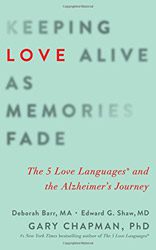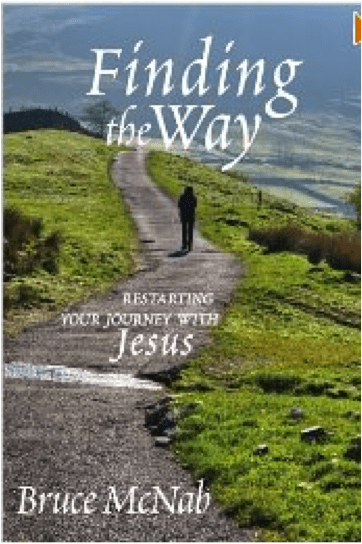When I read the stories in Keeping Love Alive as Memories Fade, I’m reminded of our own family’s journey of loss—the whispered conversations, the hurried runs over to Grandma’s house, the phone calls with out-of-state family, the boxing up of a house of memories, and the quiet goodbyes. Grandma left us long before she moved to live with her daughter in Florida.
Years later, visiting that daughter, my aunt, I saw pictures of Grandma in her final years. Her feistiness, suspicions, and covert behavior had long ceased, and she was now quiescent—even silent—in her long descent. But my aunt told me one thing I hope I’ll always remember. Sometimes Grandma would sit in her wheelchair and weep, crying “Mama! Mama!”
Eighty-four years old, having lived without her mother for many decades and now enduring a long lingering in the quiet emptiness of her own mind, my Grandma ached with love and longing for her mother. Love never fails.
Keeping Love Alive reassures us that the language of love can be spoken and heard even when words, memories, gestures, and habits have all faded away. Languages, actually. The authors build on the work of Gary Chapman’s 1991 classic, The 5 Love Languages. Chapman, Deborah Barr, and Edward Shaw have collaborated on this book taking the reader through the struggles of love and loss, providing guidance and encouragement for the journey of both caretaker and the beloved.
My community, like so many others, has members with this disease, and the stories of hope and helplessness are powerful reminders of our absolute dependence on the love and mercy of God. With his permission, I share with you the story of my friends, Jay and Janene.
Jay’s Story: My Gift on Her Birthday
It happened right in the middle of our now typically truncated and difficult conversations in which Janene struggles to put together a five- or six-word sentence…she spoke a perfectly lucid and stunning sentence on this, her 67th birthday. This singular sentence in an otherwise painful visit to her memory care facility brought me a “peace which passes all understanding.” It truly was a gift to this soul-weary companion of hers.
Now the phenomenon of occasional articulate communication is not terribly unusual amongst folks afflicted with fronto-temporal dementia (FTD). But what made this sentence so stunning was Janene’s totally uncharacteristic self-awareness, insight, and consequential thinking, the very things that FTD steals from the brightest of individuals like Janene and which she had not expressed in months, actually years, if I allow myself to acknowledge the pain of it all.
One of the first cognitive and emotional intelligence functions to be lost with the advance of FTD is self-awareness—the capacity to recognize one’s own emotional experience and describe it accurately. For years, Janene insisted that there was nothing wrong even in the face of mounting evidence that words were becoming more difficult for her to retrieve and previously refined interpersonal skills were diminished, which friends and family were consistently reporting to me. She was certain no one could see the change and progression of the disease, insisting that I not talk to my family about it.
What makes FTD such a painful interpersonal and family disease is that it attacks the fronto lobe of the brain where personality, social decorum, self-management, and the whole range of life-enriching relationship skills are housed. Moments of intimacy and deep communication become less frequent and eventually are completely absent as the disease progresses.
So those preciously unique moments that define a good marriage are gradually, but irretrievably lost as the disease makes its unrelenting advance. Nicknames. Our jokes. Spontaneous affection. Bad meals. Gourmet meals. Nights out. Unabashed candor. Accomplishments celebrated. Full moon. Knowing glances. Biking. Camping. Laughter. Worship. Deep conversation. These and countless other previously taken-for-granted meanings and moments that made up the warp and woof of our everyday life together faded away like the twilight. I was no longer living with my soul mate; instead a stranger had taken up residence in my dear friend’s body and mind. It is the most heartbreakingly painful and excruciatingly protracted metamorphosis I have been called on to witness. And frankly, in all probability it is a long way from over.
There are more than a few spiritual struggles that have been thrust upon me over the last decade in my front row seat to Janene’s agony and suffering. And agony may seem melodramatic, but not if you knew who she once was, not at all. The challenge for me that comes to mind is one Dante describes in the Inferno (now there is one dramatic poet) as he encounters the Virtuous Pagans on his journey toward Hell with his friend Virgil. Dante finds that “they are not tormented, but their only pain is that they have no hope.” No cure. No effective medication. No breakthrough research. No tips and tools. No help, basically.
My antidote to Dante’s painfully relevant observation and persistent temptation to give up is St. Paul’s perspective; he who was no strange to suffering himself had every reason to lose hope or despair of life itself, and after arguing that the richest spiritual truths are carried in ordinary clay pots (us), he writes, “Therefore we do not lose heart. Though outwardly we are wasting away, yet inwardly we are being renewed every day. For our light and momentary troubles are achieving for us an eternal glory that far outweighs them all. So we fix our eyes not on what is seen but what is unseen. For what is seen is temporal, but what is unseen is eternal.”
On days I can embrace and buddy up to Paul’s counterintuitive perspective I do quite well. I have a life to live, and by God’s grace, it is a good one. And the truth be known, there is precious little I can actually do to ease Janene’s pain or, even more humbling, to companion her in this most lonely journey. Actually, aren’t we all “wasting away”? Don’t we all know that the seen, material world will not ultimately feed our souls? Haven’t we all faced our own powerlessness in the face of an impenetrable life circumstances? And are there not times in life when all our brilliant strategizing, orchestrating, conceptualizing, masterminding, engineering, and even praying about it, all fall dramatically short? We might well come to our senses and humbly admit that we simply cannot take care of the matter at hand as we would like, so trusting in God’s Providence may give us relief, even hope. I know that is what I need to do much more consistently.
Of course, there are many ways to think about Janene’s moment of lucidity. And there are certainly more than a few possible interpretations, clinical and otherwise. So make of these words whatever you will. This is simply a verbatim report of what she said to me between bites of her birthday cake.
But for me…what a comfort, what a poignant statement of our limitations, what a spiritual and theological gem, what a precious reminder of the spiritual connection we once had, what a hope, and what a gift to me on her birthday, when Janene looked at me with now uncharacteristic clarity in those big blue eyes and said… “The Lord Jesus is taking care of me and my brain, and it makes all the difference.”












